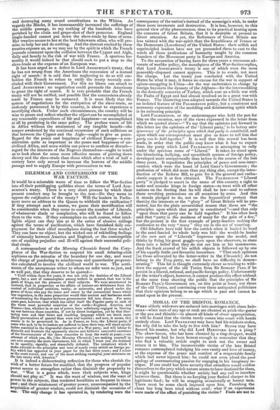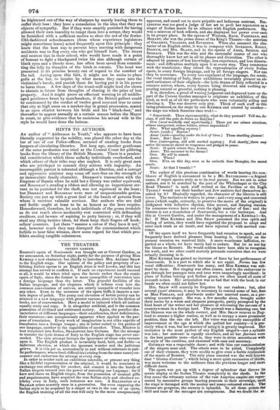MORAL OF THE BRISTOL ROMANCE.
WREN elderly widowers are seduced into marriages with sham heiresses—when men of any age or rank are cheated at prick-the-garter or the pea and thimble—in almost all kinds of clever appropriation, it will be found that the victim rarely comes into court with hands entirely clean. Lord FRANKFORT may have had his trinkets stolen, but why did he take the lady to live with him ? SUISSE may have fleeced his master, but why did Lord HERTFORD keep a pimp ? The chaw-bacon, who has been cheated by a ring-dropper, would have escaped had he been honest enough to remember that they who find a valuable article ought to seek out the owner and return it to him. The inconceivable victim of the late Bristol romance contemplated indulging his own vanity and love of money, at the expense of the peace and comfort of a respectable family which had never injured him : he could not even plead the poor apology of overmastering passion for engaging in his imaginary intrigue. Hone could but have security that swindlers would confine themselves to the prey which nature seems to have destined for them, it might be questionable whether society had any call to interfere between them. But there is no keeping your fleshed sharper to his legitimate food; he will be snapping occasionally at honest men. There must be some check imposed upon him. Punishing the cheat has long been tried without avail : what if an experiment were made of the effect of punishing the victim? Fools are not to be frightened out of the way of sharpers by merely leaving them to suffer their loss : they have a consolation in the idea that they are objects of sympathy. But if they were smartly punished for having allowed their own rascality to tempt them into a scrape, they would be furnished with a sufficient motive to shun the net of the fowler. Old-fashioned schoolmasters (from whose experience legislators might sometimes learn) acted frequently upon this principle : they knew that the best way to prevent boys meeting with dangerous accidents was to flog every one who got himself hurt. The nicest and neatest dux in their school, who would have made it a point of honour to fight a blackguard twice his size although certain of black eyes and a bloody nose, has often been saved from committing the folly by thoughts of the birch is retentis. The head was preserved in its pristine beauty out of regard to the comfort of the tail. Acting upon this hint, it might not be amiss to place gulls at the bar, to inquire by what means they came into the victimizer's hands, and punish them for having put it in his power to harm them. A few days of the tread-mill might lead the clown to abstain in future from thoughts of sharing in the price of lost property. And it might prove an effectual warning to all middleaged gentlemen beset by matchmakers, if the Bristol gallant could be condemned by the verdict of twelve good men and true to enter that city at high noon on a market-day in grand procession, seated in an open chariot between his bride and his "black-foot," and thereafter to appear annually at a certain season before the Mayor in court, to give evidence that he maintains his actual wife in the style he would have done the heiress.



























 Previous page
Previous page